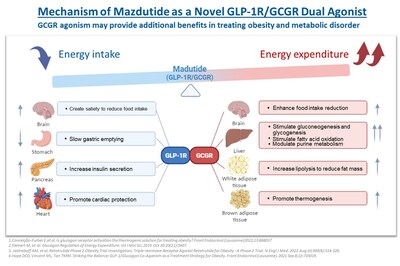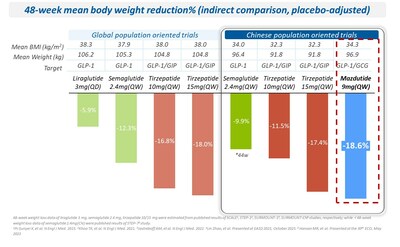ROCKVILLE, Md. and SUZHOU, China, Jan. 1, 2024 /PRNewswire/ — Innovent Biologics, Inc. (Innovent) (HKEX: 01801), a world-class biopharmaceutical company that develops, manufactures and commercializes high-quality medicines for the treatment of oncology, metabolic, autoimmune, ophthalmology and other major diseases, announces that the first participant has been successfully dosed in a Phase 3 clinical trial (GLORY-2) of higher dose 9 mg mazdutide (Innovent R&D Code: IBI362) , a glucagon-like peptide 1 receptor (GLP-1R) and glucagon receptor (GCGR) dual agonist, in Chinese adults with obesity. This is also the fourth large-scale phase 3 clinical study of mazdutide.
GLORY-2 plans to enroll 450 subjects and randomize to receive mazdutide 9 mg treatment or placebo. The primary endpoints include the percentage change in body weight from baseline to week 60 and the proportion of subjects with 5% or more body weight loss from baseline at week 60.
A Phase 2 study conducted in Chinese people with obesity with a BMI ≥ 30 kg/m2 (NCT04904913) showed that after 48 weeks of treatment, mazdutide 9mg achieved 18.6% placebo-adjusted mean percent reduction in body weight. Furthermore, mazdutide reduced waist circumference, blood pressure, lipids, serum uric acid, transaminase and liver fat, bringing multiple metabolic benefits to the subjects. Mazdutide was well tolerated and the overall safety profile was similar to other GLP-1 class drugs, with no new safety signals observed.
Professor Linong Ji, the principal investigator of the study, Peking University People’s Hospital, stated, “Accumulated evidence showed that Chinese people generally have higher percentages of body fat and higher rates of cardiovascular risk factors and all-cause mortality than western population at given BMI levels, therefore overweight and obesity in adults in China are defined with lower BMI cutoffs (overweight cutoff BMI 24 kg/m2, obesity cutoff BMI 28 kg/m2). The number of people with obesity with a BMI over 30 kg/m2 in China is huge and still increasing yearly. This subgroup of people with obesity, bear a greater burden of cardiovascular and metabolic diseases. They require special attention in clinical weight management and early prevention and treatment of metabolic syndrome[i], whereas the effective drug treatment options are limited. The mazdutide 9 mg Phase 2 study in Chinese people with obesity with a BMI ≥30 kg/m2 demonstrated strong weight loss efficacy, multiple cardiovascular metabolism improvements as well as a good safety profile[ii]. Mazdutide is potentially the first weight loss drug in China targeting people with more severe obesity. I will work with the researchers of GLORY-2 to promote and complete this study, hoping to provide high-quality clinical evidence for weight loss research and bring better treatment options to Chinese patients with moderate to severe obesity.”
Dr. Lei Qian, Vice President of Clinical Development at Innovent, stated, “Different dosage regimens of mazdutide are suitable for different groups of people with obesity. Mazdutide 9 mg is specifically developed to meet the weight loss needs of people with moderate to severe obesity with a BMI above 30 kg/m2 in China. In a phase 2 study, mazdutide 9 mg showed a more than 18% placebo -adjusted weight loss and multiple cardiovascular and metabolic benefits. In addition, mazdutide 9 mg has simple titration steps and a good safety profile. We are hopeful that mazdutide 9 mg will fully demonstrate its powerful efficacy and good safety in the GLORY-2 study, and bringing a more ideal drug treatment option to patients with moderate to severe obesity, whose current recommended treatment is bariatric surgery.”
About Obesity
China has the largest population of people with overweight or obesity in the world[iii], with the obesity rate likely to increase. Obesity can lead to a range of complications or related diseases that impact life expectancy and deteriorate the quality of life. Deaths caused by overweight and obesity accounted for 11.1% of deaths related to chronic non-communicable diseases in 2019, a significant increase from 5.7% in 1990[iv]. Obesity is a chronic disease that requires long-term management, and there is a lack of long-term effective and safe treatments in China. Lifestyle intervention is the first choice and basic treatment for patients with overweight or obesity. However, a considerable percentage of patients fail to achieve the desired weight loss goal upon lifestyle intervention and may require pharmacological intervention. Traditional pharmacological therapies have been of limited efficacy and safety issues, highlighting the unmet need for more effective and safe therapies in China.
About Mazdutide (IBI362)
Innovent entered into an exclusive license agreement with Eli Lilly and Company (Lilly) for the development and potential commercialization of OXM3 (also known as mazdutide), a GLP-1R and GCGR dual agonist, in China. As a mammalian oxyntomodulin (OXM) analogue, in addition to the effects of GLP-1 receptor agonists on promoting insulin secretion, lowering blood glucose and reducing body weight, mazdutide may also increase energy expenditure and improve hepatic fat metabolism through the activation of glucagon receptor. Mazdutide has demonstrated excellent weight loss and glucose-lowering effects in clinical studies, as well as reducing waist circumference, blood lipids, blood pressure, blood uric acid, liver enzymes, liver fat content and improved insulin sensitivity. Currently, four phase 3 studies of mazdutide in Chinese patients with overweight or obesity (GLORY-1 and GLORY-2) and type 2 diabetic (DREAM-1 and DREAM-2) subjects are underway.
About Innovent
Inspired by the spirit of “Start with Integrity, Succeed through Action,” Innovent’s mission is to discover and develop, manufacture and commercialize high-quality biopharmaceutical products that are affordable to ordinary people. Established in 2011, Innovent is committed to discovering and developing, manufacturing and commercializing high-quality innovative medicines for the treatment of oncology, autoimmune, cardiovascular and metabolic, and ophthalmology diseases to enhance the quality of the patients’ lives. Innovent has 10 products in the market, including TYVYT® (Sintilimab Injection), BYVASDA® (Bevacizumab Injection), SULINNO® (Adalimumab Injection), HALPRYZA® (Rituximab Injection), Pemazyre® (Pemigatinib Oral Inhibitor), olverembatinib, Cyramza® (Ramucirumab Injection), Retsevmo® (Selpercatinib Capsules ), FUCASO® (Equecabtagene Autoleucel Injection) and SINTBILO® (Tafolecimab Injection). Additionally, we have 2 NDA under NMPA review, 5 assets in Phase III or pivotal clinical trials, and 19 more molecules in early clinical stage.
Innovent has also entered into 30 strategic collaborations with Eli Lilly, Roche, Sanofi, Adimab, Incyte, MD Anderson Cancer Center and other international partners. We strive to work with many collaborators to help advance the biopharmaceutical industry, improve drug availability and enhance the quality of the patients’ lives.
Note:
TYVYT® (sintilimab injection) is not an approved product in the United States.
BYVASDA® (bevacizumab biosimilar injection), SULINNO®, and HALPRYZA® (rituximab biosimilar injection) are not approved products in the United States.
TYVYT® (sintilimab injection, Innovent)
BYVASDA® (bevacizumab biosimilar injection, Innovent)
HALPRYZA® (rituximab biosimilar injection, Innovent)
SULINNO® (adalimumab biosimilar injection, Innovent)
Pemazyre® (pemigatinib oral inhibitor, Incyte Corporation). Pemazyre® was discovered by Incyte Corporation and licensed to Innovent for development and commercialization in Mainland China, Hong Kong, Macau and Taiwan.
CYRAMZA® (ramucirumab, Eli Lilly). Cyramza® was discovered by Eli Lilly and licensed to Innovent for commercialization in Mainland China.
Retsevmo® (selpercatinib, Eli Lilly). Retsevmo® was discovered by Eli Lilly and licensed to Innovent for commercialization in Mainland China.
Disclaimer: Innovent does not recommend any off-label usage.
Forward-looking statement
This news release may contain certain forward-looking statements that are, by their nature, subject to significant risks and uncertainties. The words “anticipate”, “believe”, “estimate”, “expect”, “intend” and similar expressions, as they relate to Innovent Biologics (“Innovent”), are intended to identify certain of such forward-looking statements. The Company does not intend to update these forward-looking statements regularly.
These forward-looking statements are based on the existing beliefs, assumptions, expectations, estimates, projections and understandings of the management of the Company with respect to future events at the time these statements are made. These statements are not a guarantee of future developments and are subject to risks, uncertainties and other factors, some of which are beyond the Company’s control and are difficult to predict. Consequently, actual results may differ materially from information contained in the forward-looking statements as a result of future changes or developments in our business, the Company’s competitive environment and political, economic, legal and social conditions.
The Company, the Directors and the employees of the Company assume (a) no obligation to correct or update the forward-looking statements contained in this site; and (b) no liability in the event that any of the forward-looking statements does not materialise or turn out to be incorrect.
|
[i] Body-mass index and obesity in urban and rural China: findings from consecutive nationally representative surveys during 2004–18 |
|
[ii] https://www.innoventbio.com/InvestorsAndMedia/PressReleaseDetail?key=407 |
|
[iii] Pan XF, Wang L, Pan A. Epidemiology and determinants of obesity in China. Lancet Diabetes Endocrinol 2021; 9: 373–92. |
|
[iv] Institute for Health Metrics and Evaluation. Global Health Data Exchange. GBD results tool. http://ghdx.healthdata.org/gbd-resultstool (accessed Jan 10, 2021). |
SOURCE Innovent Biologics






